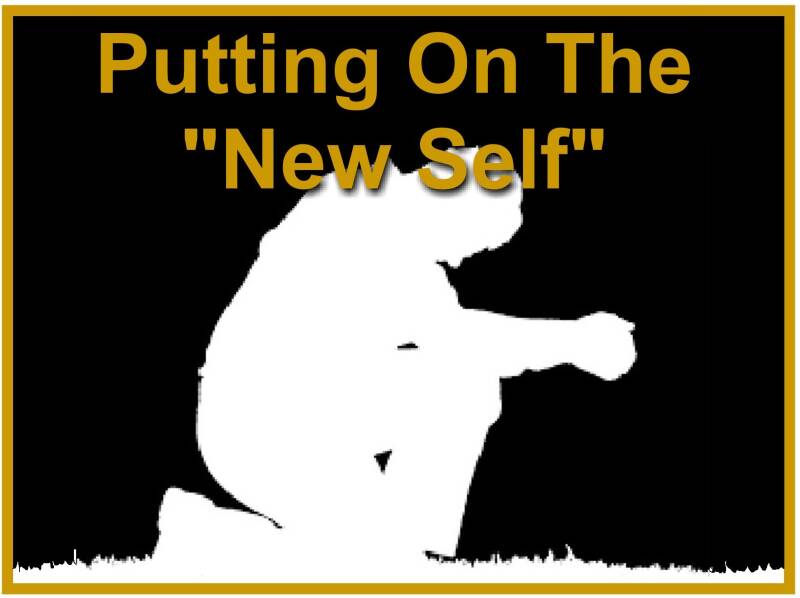You were taught, with regard to your former way of life, to put off your old self, which is being corrupted by its deceitful desires; to be made new in the attitude of your minds; and to put on the new self, created to be like God in true righteousness and holiness.
Believers are called to discard our old selves and put on our new selves. This has significant implications for our behavior and relationships. In Ephesians 4, Paul looks at some examples of transformation that will be seen in us when we are regenerated and have put our old selves on the cross.
There are three areas in which radical transformation can be seen. Each has to do with one of the Ten Commandments: the ninth (Exodus 20:16), the eighth (v. 15), and the sixth (v. 13). With each example, Paul continues to apply the idea of “putting on” the new self and “putting off” the old self.
Firstly, each believer is urged to put off falsehood and speak truthfully to his neighbor (Ephesians 4:25): there should be integrity in his speech, communication, and relationships. The reason—”for we are all members of one body”—is that if the various parts of our body practice deceit when they communicate with one another, we will have a sick, confused, and paralyzed body. How much more true this will be in the church, where we are to speak the truth in love (v. 15).
Secondly, we must avoid sinning when we get angry (v. 26). Becoming angry is a visceral response and we may not be able to prevent it, but what we do next determines whether we sin or not. Anger must be quickly dealt with in a godly way and must not be allowed to linger over to the next day. To harbor anger and bitterness is to allow the devil to gain a foothold in our lives. The devil is happy to provoke our anger to boiling point or to let it simmer for a long time and thus destroy our souls; anger is like acid that harms the vessel in which it is stored. Jesus revealed the connection between nursing anger and murder (Matthew 5:21–22).
Thirdly, he who used to steal must stop (Ephesians 4:28). People steal for various reasons, such as laziness and greed. The transformed believer must now work (no more laziness) and from his wages share with those in need (no more greed). This illustrates the “putting off” and “putting on” concept. We are not only to renounce sin, but also to pursue goodness.
Reflect:
-
Consider how people avoid speaking truthfully, e.g. speaking only about inconsequential matters. Why is telling the truth important for the health and maturity of the church?
-
Why do people enjoy nursing their anger? Why is it important to deal quickly with anger, and how does this reflect the character of God (Psalm 30:5)?
Excerpted and adapted from Journey Through Ephesians by Robert Solomon. © 2016 by Robert Solomon. Used by permission of Discovery House. All rights reserved.
Related Scripture
Ephesians 4:24-28 NIV
24 and to put on the new self, created to be like God in true righteousness and holiness.25 Therefore each of you must put off falsehood and speak truthfully to your neighbor, for we are all members of one body. 26 “In your anger do not sin”[a]: Do not let the sun go down while you are still angry, 27 and do not give the devil a foothold. 28 Anyone who has been stealing must steal no longer, but must work, doing something useful with their own hands, that they may have something to share with those in need.
-Matthew 5:21-22 NIV
21 “You have heard that it was said to the people long ago, ‘You shall not murder,[ and anyone who murders will be subject to judgment.’ 22 But I tell you that anyone who is angry with a brother or sister will be subject to judgment. Again, anyone who says to a brother or sister, ‘Raca,’ is answerable to the court. And anyone who says, ‘You fool!’ will be in danger of the fire of hell.
Related Prayer
Dear Heavenly Father,
I Thank You (Father God) that You want us to live in freedom. That just because we have lived a certain way with a certain habit, programming, training or sin much of our entire life, that it doesn’t define us forever. Thank You (Father God) that when we become Believers and Follower of You and Your Word, we are able to “put off the old man or woman,” the old lustful things of our flesh, and “put on the new man or woman,” pursuing a lifestyle of holiness and righteousness. Through the Holy Spirit’s empowering, we are able to renew our minds day by day and clothe ourselves in purity. Thank You (Father God) for the gift of the Holy Spirit and for the power that You (through Your divine grace) have given us. (Father God) We ask that You renew our minds everyday and promptly alert us of anything that we are hanging onto in our former life that is hindering us from walking closely with You in our new life. We love You Lord and we thank You (Father God) for freeing us from the death grip of our old sin filled life. (Father God) We gladly surrender to this new and righteous way of living in Your Son, our Lord & Savior, Jesus Christ. (Father God) You are worthy to be praised!
In Jesus’ Holy Name,
Amen




